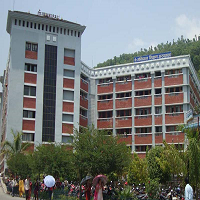Manipal College

Manipal College of Medical Sciences
- Address: Kaski 33700, Pokhara
- Phone: +977-61-440600, 440390, 440387 (kindly call between 8:30am & 4:30pm, Sunday to Friday)
- Affiliation: Kathmandu University
- Dean: B.M. Nagpal
- Undergraduate tuition and fees: 960,000 NPR (2012), International tuition: 23,100 USD (2012)
- Website : www.manipal.edu.np
ABOUT US
On 18th October 1992, a historic agreement was signed between the-then His Majesty’s Government of Nepal and the Manipal Education and Medical Group for setting up a Medical college.
Thus the Manipal College of Medical Sciences (MCOMS), affiliated to Kathmandu University was set up at Pokhara in 1994 with an MBBS program. It was the first private institution to establish a medical college in Nepal. Further to this, the 750 bed Manipal Teaching Hospital (MTH), Pokhara commenced in 1998. The college and hospital have been set up with modern facilities for modern education and health delivery.
MBBS PROGRAM
BACHELOR OF MEDICINE AND BACHELOR OF SURGERY (MBBS PROGRAM)
Manipal College provides a four-and-a-half-years MBBS degree program in all the preclinical subjects and selected clinical subjects. The four-and-a-half years MBBS course is divided into 9 semesters of 6 months each. Upon successful completion of the course, students will undergo a 1 year compulsory residential rotating internship. The medium of instruction is English.
Approx 1700 students have passed out of MOCMS till date & most of these graduates have successfully qualified for USMLE (USA), PLAB (UK), ERPM (Sri-Lanka), AMC (Australia) with commendable scores and also completed their post-graduation in USA, Canada, UK, South Africa & Australia.
MBBS CURRICULUM-PRECLINICAL (SEMESTERS I-IV):
- The first & second year of instruction cover integrated Preclinical Sciences, Community Medicine, Introduction to Clinical Medicine and Medical Informatics
- Preclinical Sciences include Anatomy, Biochemistry, Microbiology, Pathology, Pharmacology & Physiology. These subjects are taught in an integrated manner & are incorporated into Community Medicine and Introduction to Clinical Medicine. Students gain clinical knowledge & problem solving skills. Medical Informatics is integrated to provide computer expertise relevant to medical education
- At the end of the first year & the second year there are university examinations on each of the above subjects. A student must complete all subjects of the pre-clinical sciences – first year MBBS within three years from the date of admission & second year within four years from the date of admission
- A student is required to pass all the preclinical subjects before he/she is allowed to be promoted to the Clinical Sciences (Semester V).
CLINICAL SCIENCES (SEMESTER V-IX):
- Clinical Sciences include the subjects of Forensic Medicine, Community Medicine, Ophthalmology (EYE), Otorhinolaryngology (ENT), Medicine & Allied Subjects (Psychiatry, Dermatology, Radiology, Emergency Medicine & more), Surgery & Allied Subjects (Orthopedics, Anesthesiology & more), Obstetrics & Gynaecology, Paediatrics, and other allied medical and surgical specialities & subspecialities
- The third year MBBS university examinations in Forensic Medicine, Community Medicine, Ophthalmology & Otorhinolaryngology are held at the end of the seventh semester. A student cannot be admitted to the ninth semester until he/she has passed all four subjects. At the end of nine semesters are the final MBBS university examinations in Medicine and Allied Subjects, Surgery & Allied Subjects, Obstetrics & Gynaecology & Paediatrics. Clinical training is conducted at the Manipal Teaching Hospital and associated local hospitals
- MCOMS also reached out to people in their homes through its community health program initiatives, wherein a multi-disciplinary team of doctors, interns, students and allied health workers establishes camps in rural areas. Interaction with the community is well established through regular field trips and adoption of local families.
EVALUATION:
A system of continuous evaluation is followed through fortnightly tests, semester exams, end-posting evaluations, seminars & problem based learning sessions. The continuous evaluation system has helped to achieve excellent results in the university examinations. Parents are kept informed of the progress of their wards.
TEACHING METHODOLOGY:
The teaching program in preclinical consists of :–
- Didactic classroom lectures
- Practicals
- PBLs/Seminars
- Community/ Hospital visits.
Fortnightly academic time tables are prepared, giving details of the teaching program with topics to be covered. These are put up well in advance. To support the integrated approach, seminars and PBLS are conducted every fortnight on important diseases/ syndromes. This gives the preclinical students a better clinical orientation of the systems being taught. Concurrent evaluation is done by fortnightly test, viva-voce, seminars and PBLs. Semester examinations are held at the end of each 6 months.
The Teaching Program in Clinical Sciences consists of :-
- Didactic classroom lectures
- Clinical/practical training in hospitals, wards / Community visits/ Field training camp
- Symposia/Seminars
- Clinical meetings/ Faculty talks/ Guest lectures.
The above teaching sessions take an average of forty two hours/week, out of which there are 12 didactic lectures per week. The stress is mainly on Clinical/ Practical training. The students are periodically assessed by conducting end posting clinical exams (Clinical and Viva), mid-semester exams and end-semester exams.
INTERNSHIP :- One year of rotating internship is compulsory. The Kathmandu University and Nepal Medical Council have approved six different schemes for internship for students of different countries, as per the requirements of their medical councils. MCOMS students do their internships in Nepal, India, Sri Lanka, Australia, USA, UK and South Africa. Internship rules are subject to change as per the rules of the medical council.
© 2020 All Rights Reserved